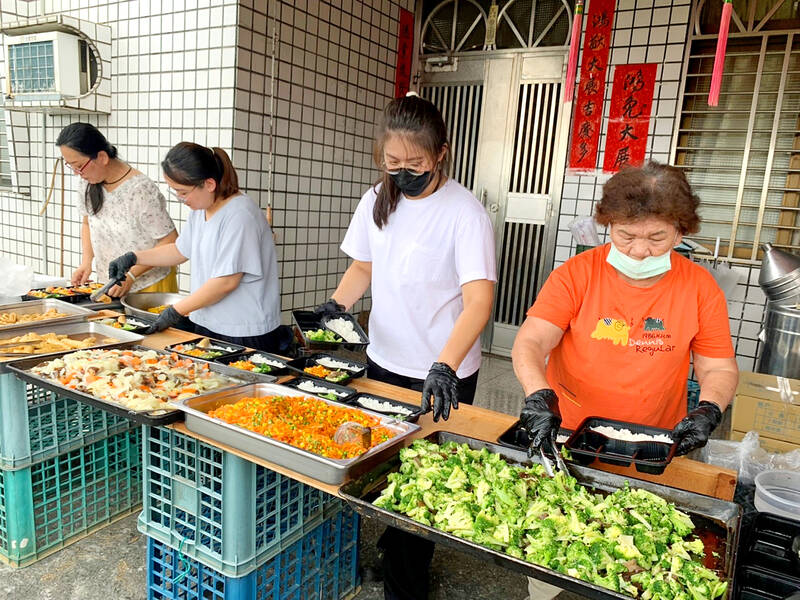It’s often said that, if a person worries about climate change, they should stop eating meat and not own a car.
Following a two-week experiment that compared vegan, vegetarian and meat-eating lifestyles, a May 2, 2022 report on the BBC’s Web site concluded: “What is clear from our experiment (and more importantly, from rigorous scientific research) is that, on average, a plant-based diet has significantly fewer emissions. Eating large amounts of meat, especially beef, is a sure way to increase your emissions many times over.”
As reported in this newspaper on Nov. 10, 2021 (“Fighting climate change from the ground up”), Taiwan’s per capita meat consumption has been stable since the late 1990s at around 80kg per person per year. However, the amount of beef eaten per person has increased more than 65 percent since 2008.

Photo: Steven Crook
According to the Oxford University-affiliated Web site Our World In Data, driving a conventional car in the UK generates more than double the carbon emissions per passenger kilometer of a London city bus, and about five times that of traveling by underground or overground train.
However, what behavioral economists refer to as the “rebound effect” suggests that the actual environmental gains from swearing off meat or giving up one’s car are often minimal.
A popular example of rebound is that of drivers who buy more fuel-efficient vehicles. Because getting around by car is less expensive than before, they may move further from their workplace and drive greater distances on their days off.

Photo: Steven Crook
In some instances, the introduction of energy-efficient technologies can actually backfire, a phenomenon first described in 1865 by British economist William Jevons. He noticed that breakthroughs in the design of coal-burning steam engines resulted in their proliferation throughout industry, so that, even as the amount of coal required to pump a cubic meter of water a given distance fell, total demand for coal grew.
DIETARY CHANGES
The presence or absence of meat isn’t the only difference between non-vegetarian eating patterns and a nutritionally sound vegetarian diet. People who don’t eat beef, chicken or pork typically meet their caloric or protein needs by consuming greater amounts of cereal grains, nuts and seeds, certain fruits and vegetables and legumes such as beans and lentils.

Photo courtesy of Huang Hsiao-en
On Sept. 17 this year, a report in the Liberty Times (the Chinese-language sister newspaper of the Taipei Times) quoted nutritionist Chen Kuan-jung (陳冠蓉) as saying that Taiwanese switching to a meat-free diet would do well to eat yellow soybeans, black soybeans and/or edamame at every meal, to ensure they get sufficient protein.
Dietary blueprints published on the Web site of the Taiwan Vegetarian Nutrition Society (台灣素食營養學會, TVNS) advise vegans to load up on adzuki beans, mung beans and pinto beans as well as soy products. Like Chen, the TVNS stresses the benefits of eating wholegrain (brown) rice rather than polished (white) rice.
This raises an energy-use issue, as brown rice requires a lot more cooking than white rice. There’s also evidence that vegetarian diets lead to greater rice consumption. In her 2014 master’s thesis on vegetarianism and the rebound effect, submitted to the Department of Economics at the Swedish University of Agricultural Sciences, Janina Grabs pointed out that vegetarians in the US eat 51g of rice per day on average, while non-vegetarians consume just 23g.

Photo: Lu Hsien-hsiu, Taipei Times
Having settled on representative vegetarian and non-vegetarian diets for the sake of comparison, Grabs — who now teaches in the Department of Society, Politics and Sustainability at ESADE Business School in Barcelona — calculated that, if all non-food consumption remained the same, the typical Swedish person sticking to vegetarianism has a total energy footprint 1.81 percent below than that of a meat-eating compatriot. In terms of greenhouse gases, the savings are somewhat greater at 4.15 percent.
Grabs described these potential savings as “not insignificant: summarized over the entire Swedish population, they amount to… the equivalent of 2,551km driven per person. In greenhouse gas terms, each Swede would even save the equivalent of 3,979km driven per year” by going vegetarian.
Grabs found that switching to a vegetarian diet saves the average Swedish consumer an estimated 1.89 percent of their current annual budget, or around one sixth of their expenditure on food. How they then use that extra cash determines the size of the rebound effect.
“After going vegetarian, we find that the average consumer re-spends most of her savings in the transportation and leisure categories, while furniture, clothes and services also receive minor shares of the re-expenditure,” Grab wrote.
Analyzing this new consumption basket, she found that the average consumer “would barely save any energy compared to the baseline scenario and only save 2.1 percent of the original greenhouse gas emissions” by going vegetarian.
Swedish consumers who stick to their usual consumption patterns after giving up meat “would forgo almost all of the potential energy savings and nearly half of the greenhouse gas emission savings, as we find rebound effects of 96 percent and 49 percent respectively,” stated the thesis.
To avoid this rebound effect, those who adopt vegetarianism or veganism for environmental reasons should spend any money they save on services rather than physical goods, Grabs suggested. Another option would be to buy more expensive (and more environmentally friendly) organic produce.
As Grabs pointed out, “Unless one considers the entire purchasing behavior of individuals, campaigns to convince consumers to change their choices one at a time may have no notable or even adverse effects. In general, rebound effects will always occur as long as the available income stays constant.”
She went on to argue that, in the long term, “the most sustainable way to reduce the footprint of individual consumption would be to convince consumers to explore maximizing their utility in non-material ways, for example by choosing a lower amount of working hours and exchanging more of their income for leisure time.”
Of course, only in rich countries like Sweden might people be willing to accept lower incomes in return for more free time.
DEMAND REBOUND
Another type of rebound effect suggests that a well- intentioned decision to stop eating meat — even when coupled with a conscious decision not to use the money thus saved in ways that’ll cause carbon emissions — won’t much help the planet. This is because, in less affluent societies, there are millions of people who’d love to consume more meat if they could afford it.
An April 16, 2021 Wageningen Economic Research blog post points out that, even if Europeans were to eat significantly less animal protein, there might not be any meaningful drop in production (which, rather than consumption, is the activity that generates carbon emissions). This is because “a decline in prices due to reduced meat consumption in the EU may lead to a rebound effect elsewhere, where the lower prices for meat induce additional meat consumption.”
By denying yourself pork-filled dumplings and deep-fried chicken cutlets, you may just be making meat more affordable for people in China and Mexico. Realizing this doesn’t mean that going vegetarian is entirely pointless. But it’s a good starting point for discussions about the kind of global action that’s needed if humanity is to rein in greenhouse gas emissions and avert climate catastrophe.
Steven Crook, the author or co-author of four books about Taiwan, has been following environmental issues since he arrived in the country in 1991. He drives a hybrid and carries his own chopsticks. The views expressed here are his own.

Taiwanese chip-making giant Taiwan Semiconductor Manufacturing Co (TSMC) plans to invest a whopping US$100 billion in the US, after US President Donald Trump threatened to slap tariffs on overseas-made chips. TSMC is the world’s biggest maker of the critical technology that has become the lifeblood of the global economy. This week’s announcement takes the total amount TSMC has pledged to invest in the US to US$165 billion, which the company says is the “largest single foreign direct investment in US history.” It follows Trump’s accusations that Taiwan stole the US chip industry and his threats to impose tariffs of up to 100 percent

On a hillside overlooking Taichung are the remains of a village that never was. Half-formed houses abandoned by investors are slowly succumbing to the elements. Empty, save for the occasional explorer. Taiwan is full of these places. Factories, malls, hospitals, amusement parks, breweries, housing — all facing an unplanned but inevitable obsolescence. Urbex, short for urban exploration, is the practice of exploring and often photographing abandoned and derelict buildings. Many urban explorers choose not to disclose the locations of the sites, as a way of preserving the structures and preventing vandalism or looting. For artist and professor at NTNU and Taipei

March 10 to March 16 Although it failed to become popular, March of the Black Cats (烏貓進行曲) was the first Taiwanese record to have “pop song” printed on the label. Released in March 1929 under Eagle Records, a subsidiary of the Japanese-owned Columbia Records, the Hoklo (commonly known as Taiwanese) lyrics followed the traditional seven characters per verse of Taiwanese opera, but the instrumentation was Western, performed by Eagle’s in-house orchestra. The singer was entertainer Chiu-chan (秋蟾). In fact, a cover of a Xiamen folk song by Chiu-chan released around the same time, Plum Widow Missing Her Husband (雪梅思君), enjoyed more

From insomniacs to party-goers, doting couples, tired paramedics and Johannesburg’s golden youth, The Pantry, a petrol station doubling as a gourmet deli, has become unmissable on the nightlife scene of South Africa’s biggest city. Open 24 hours a day, the establishment which opened three years ago is a haven for revelers looking for a midnight snack to sober up after the bars and nightclubs close at 2am or 5am. “Believe me, we see it all here,” sighs a cashier. Before the curtains open on Johannesburg’s infamous party scene, the evening gets off to a gentle start. On a Friday at around 6pm,